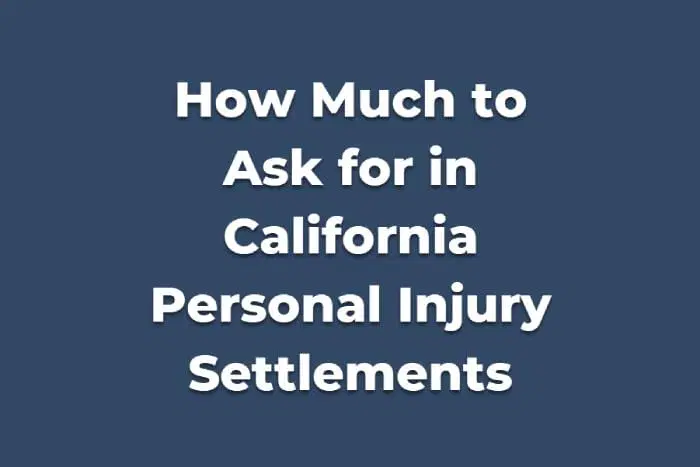
3 Amounts to Ask for in California Personal Injury Settlements
Legally reviewed by: Jessica Anvar Stotz, JD, MBA
How Much to Ask for in a Personal Injury Settlement
| Severity of Injury | Settlement to Ask for |
| Minor | Approximately: $2,500 – $15,000 |
| Moderate | Approximately: $15,000 – $100,000 |
| Severe | Approximately: $100,000 – $1,000,000+ |
Brief overview: The amount to ask for in a personal injury settlement depends on the total of your economic and non-economic damages. Many personal injury attorneys suggest to start negotiations at a rate 75–100% higher than your bottom line to have room to negotiate, or two to three times higher than your estimated settlement.
Estimate What Your Personal Injury Settlement Might Be Worth
Looking to see how much your personal injury case might be worth? Use our personal injury settlement calculator below to get an approximated estimate in 90 seconds or less.
Factors That Can Maximize Personal Injury Settlements
- Medical Expenses and Future Costs: Document all current medical expenses and anticipate future medical costs related to the injury.
- Lost Wages and Future Earnings: Provide evidence of lost income due to the injury. Consider potential future earnings affected by ongoing disabilities or rehabilitation.
- Pain and Suffering: Clearly express the physical and emotional toll of the injury. Use medical records, therapy sessions, or expert testimony to support the claim and maximize pain and suffering damages.
- Property Damage: Include costs for repairing or replacing damaged property resulting from the incident.
- Evidence of Liability: Gather strong evidence showcasing the other party’s fault or negligence. Eyewitness accounts, video footage, or police reports can bolster the case.
- Consultation with Medical Experts: Obtain expert opinions or medical professionals’ testimonies to validate the severity and long-term consequences of the injury.
- Hiring a Lawyer: Seek guidance from an experienced personal injury attorney to navigate complex legal procedures. A skilled attorney can negotiate effectively and build a compelling case.
- Understanding California Laws: Be aware of California’s laws regarding personal injury claims to ensure a comprehensive and accurate presentation of the case.
- Insurance Coverage Assessment: Evaluate the at-fault party’s insurance coverage to determine the maximum potential settlement amount.
- Negotiation Skills: Develop strong negotiation skills or rely on legal representation to secure the highest possible settlement. Be prepared to counter low initial offers with well-substantiated arguments and evidence.
Factors That Could Decrease Your Potential Settlement
- Comparative Negligence: If you are found partially at fault for the accident, it can significantly reduce your potential settlement.
- Pre-Existing Conditions: The existence of pre-existing medical conditions unrelated to the accident may complicate and potentially decrease the settlement.
- Lack of Strong Evidence: Insufficient or weak evidence to prove the other party’s fault or negligence may undermine your case.
- Delayed Medical Treatment: Delays in seeking medical attention after the accident may be used to argue that your injuries were not severe or related to the incident.
- Inconsistent Statements: Inconsistencies in your statements or conflicting information can be exploited to challenge your credibility and diminish settlement prospects.
- Not Following Medical Advice: If you fail to follow prescribed medical treatments or recommendations, it may be used to argue that your injuries are not as severe as claimed.
- Limited Insurance Coverage: If the at-fault party has minimal insurance coverage, it may restrict the potential settlement amount, especially if your damages exceed their policy limits.
- Unrealistic Settlement Expectations: Having overly optimistic expectations about the settlement amount may lead to dissatisfaction and a lower actual settlement.
- Independent Medical Examinations (IME): Insurers may request an independent medical examination, and unfavorable results can impact the perceived severity of injuries and, consequently, the settlement.
- Statements to Insurance Adjusters: Ill-considered statements made to insurance adjusters, especially without legal guidance, could potentially be used against you. Things like admitting fault may diminish your settlement prospects. It’s crucial to be cautious and seek legal advice before providing any recorded statements to ensure that your words don’t inadvertently harm your case.
Understanding these factors is essential for those seeking a fair personal injury settlement, as addressing potential challenges can positively influence the outcome of the case.
What Not to Do When Trying to Secure a Personal Injury Settlement
- Admitting Fault: Avoid admitting fault or making statements that could be construed as an admission of guilt. Such admissions can weaken your position during settlement negotiations.
- Neglecting Medical Attention: Don’t neglect seeking timely medical attention for your injuries. Insurance companies can use delaying medical care against you, suggesting that the injuries were not severe or were unrelated to the accident.
- Discussing the Case on Social Media: Refrain from discussing the details of your case on social media platforms. Insurance adjusters may use your posts against you to challenge the severity of your injuries or the circumstances of the accident.
- Settling Too Quickly: Avoid rushing into a settlement without fully assessing the long-term impact of your injuries. Quick settlements may not account for future medical expenses or ongoing damages.
- Providing Recorded Statements Without Legal Advice: Be cautious about providing recorded statements to insurance adjusters without consulting a personal injury attorney. Insurance companies can use these statements against you, so it’s essential to have legal guidance during the process.
- Ignoring Legal Counsel: Don’t proceed without consulting a personal injury attorney. Legal professionals can provide valuable insights, assess the strength of your case, and guide you through negotiations to ensure fair compensation.
- Exaggerating or Misrepresenting Injuries: Avoid exaggerating or misrepresenting the extent of your injuries. Honesty is crucial, and any inconsistencies may harm your credibility and settlement prospects.
- Ignoring Insurance Policy Details: Familiarize yourself with the details of your insurance policy and the at-fault party’s policy. Ignoring coverage limits or policy clauses may lead to unrealistic settlement expectations.
- Delaying the Reporting of the Accident: Promptly report the accident to the authorities and relevant parties. Delays in reporting may complicate the claims process and raise questions about the accuracy of your account.
- Engaging in Aggressive Behavior: Maintain a civil and respectful demeanor throughout the process. Aggressive behavior can harm your credibility and hinder productive negotiations.
Why Certain Types of Personal Injury Cases Settle for More or Less
Personal injury settlements vary based on factors like the nature of the injury, damages involved, and liability. Motor vehicle accidents often settle for more due to the potential for severe injuries, extensive property damage, and clear liability.
Cases like dog bites, slip and falls, or medical malpractice may have lower settlements as they might involve less severe injuries, though exceptions exist.
The extent of insurance coverage, legal complexities, and the ability to prove fault can also influence settlement amounts. Additionally, the long-term impact of injuries and associated costs play a significant role in determining the overall settlement value.
Why You Should Consider Hiring an Attorney for Your Potential Case
Consider hiring an attorney for your potential personal injury case to navigate complex legal processes, calculate damages accurately, and negotiate with insurance companies for fair compensation. Attorneys provide expert guidance, ensuring they protect your rights , and can strengthen your case by gathering crucial evidence.
With their knowledge and experience, they enhance the likelihood of a favorable outcome, especially when dealing with the complexities of personal injury law.
Connect with a Personal Injury Attorney
Looking to hire or get an opinion of a personal injury attorney? Contact LawLinq today to connect with some of the best personal injury attorneys in the state for free. We offer free consultations 24/7.


